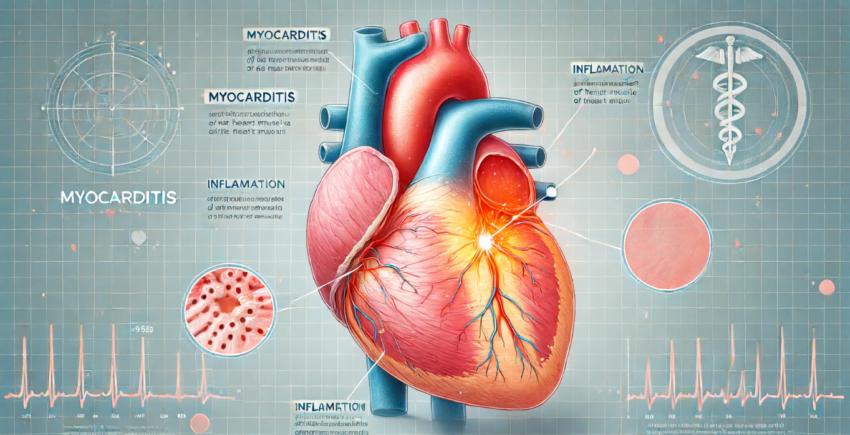| Listen to our audio presentation: Myocarditis: Symptoms, and Treatment |
Myocarditis is an inflammation of the heart muscle (myocardium) that can affect the heart’s electrical system and ability to pump blood effectively. This condition can be caused by various factors, including infections, autoimmune diseases, and exposure to certain toxins. Understanding myocarditis is essential for early diagnosis and effective treatment, which can significantly improve patient outcomes.
Causes of Myocarditis
Myocarditis can be triggered by several factors:
- Viral Infections: Viruses such as the Coxsackievirus, adenovirus, and more recently, the SARS-CoV-2 virus responsible for COVID-19, are common causes of myocarditis. These viruses infect the heart muscle, leading to inflammation.
- Bacterial Infections: Although less common, bacteria like Staphylococcus and Streptococcus can cause myocarditis, especially in individuals with weakened immune systems.
- Fungal Infections: Fungal organisms can infect the heart in immunocompromised individuals, leading to myocarditis.
- Parasites: In certain regions, parasitic infections such as Chagas disease, caused by Trypanosoma cruzi, are a significant cause of myocarditis.
- Autoimmune Diseases: Conditions like lupus and rheumatoid arthritis can cause the body’s immune system to mistakenly attack the heart muscle, resulting in myocarditis.
- Medications and Toxins: Certain drugs, including chemotherapy agents, and environmental toxins can induce myocarditis.
Symptoms of Myocarditis
The symptoms of myocarditis can vary widely, ranging from mild to severe, and sometimes resembling those of other heart conditions. Common symptoms include:
- Chest Pain: Often described as a stabbing or tight pain, chest discomfort is a common symptom of myocarditis.
- Fatigue: General tiredness and weakness are frequent complaints.
- Shortness of Breath: Difficulty breathing, particularly during exertion or while lying down, is a notable symptom.
- Heart Palpitations: Abnormal heart rhythms, or arrhythmias, can occur.
- Fever: Especially when myocarditis is caused by an infection.
- Swelling: Fluid retention leading to swelling in the legs, ankles, and feet.
Diagnosis of Myocarditis
Diagnosing myocarditis involves a combination of clinical evaluation, imaging, and laboratory tests:
- Electrocardiogram (ECG): Detects abnormal heart rhythms that may indicate myocarditis.
- Blood Tests: Elevated levels of cardiac enzymes and other markers can suggest heart muscle damage.
Echocardiogram: An ultrasound of the heart that can reveal structural and functional abnormalities. - Cardiac MRI: Provides detailed images of the heart muscle, helping to identify inflammation.
- Endomyocardial Biopsy: A procedure where a small tissue sample from the heart is examined for signs of inflammation and infection.
Treatment of Myocarditis
The treatment of myocarditis focuses on addressing the underlying cause, managing symptoms, and supporting heart function. Treatment options may include:
- Medications: Anti-inflammatory drugs, such as corticosteroids, can reduce inflammation. Antiviral or antibiotic medications are prescribed if an infection is the cause.
- Heart Medications: Drugs to manage heart failure symptoms and improve heart function, such as beta-blockers, ACE inhibitors, and diuretics.
- Lifestyle Changes: Patients are often advised to rest, avoid strenuous activities, and follow a heart-healthy diet.
- Advanced Therapies: In severe cases, treatments like intravenous immunoglobulin (IVIG) therapy, mechanical circulatory support devices, or even heart transplantation may be necessary.
Prognosis and Recovery
The prognosis for myocarditis varies based on the severity and cause of the condition. Many patients recover fully with appropriate treatment, but some may develop chronic heart conditions such as dilated cardiomyopathy, which can lead to long-term heart failure. Regular follow-up with a cardiologist is crucial for monitoring heart health and preventing complications.
Resources
- Caforio, A. L. P., Pankuweit, S., Arbustini, E., et al. (2013). Current state of knowledge on aetiology, diagnosis, management, and therapy of myocarditis: a position statement of the European Society of Cardiology Working Group on Myocardial and Pericardial Diseases. European Heart Journal, 34(33), 2636-2648.
- Cooper, L. T. (2009). Myocarditis. The New England Journal of Medicine, 360(15), 1526-1538.
- Fairweather, D., & Rose, N. R. (2007). Inflammatory heart disease: A role for cytokines. Lupus, 16(9), 665-674.
- Sagar, S., Liu, P. P., & Cooper, L. T. (2012). Myocarditis. Lancet, 379(9817), 738-747.

